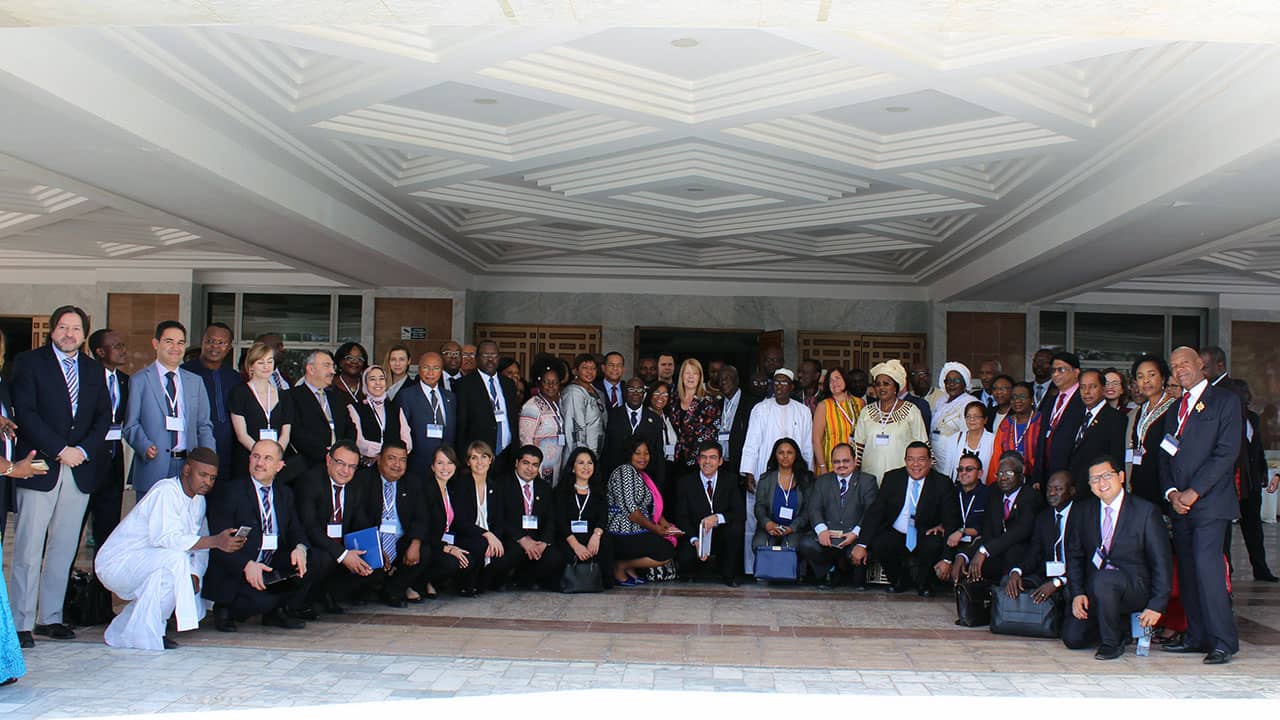
DAKAR, SENEGAL: PARLIAMENTARIANS OF THE WORLD UNITE THEIR VOICE IN SUPPORT OF THE ICC
Legislators oppose withdrawals from Rome Statute of the ICC and announce new ratification processes
At a time when three African States have formally started the process of withdrawal from the Rome Statute and several other States have been considering this policy option, over 100 Parliamentarians from 50 countries of all regions of the world met in Dakar, Senegal, and affirmed strong support for the Rome Statute system against impunity.
Parliamentarians met on the occasion of the 38th Annual Forum of Parliamentarians for Global Action (PGA), the largest transnational network of individual lawmakers, which was hosted by the National Assembly of Senegal. The Annual Forum coincided with the 9th session of the Consultative Assembly of Parliamentarians on ICC & the Rule of Law, the only global gathering of Legislators that focuses its attention since 2002 – year of entry into force of the Rome Statute – on the new permanent system of international criminal justice and its fundamental mandate to fight impunity for the most serious crimes of international concern.
While all Members of PGA were invited to this event, participants included Members of Parliament who were not PGA Members and several multi-partisan delegations. The Speakers of Parliaments from Guinea, Mali and Niger, and the Deputy Speakers of Benin and Gabon, led their official delegations.
The Speaker of the National Assembly of Senegal, Hon. Moustapha Niasse, opened the event, alongside the Minister of Justice, Mr. Sidiki Kaba, in his capacity as President of the Assembly of States Parties to the Rome Statute of the ICC, and in presence of some of the highest authorities of the State, starting with the President of the Supreme Court. The Prime Minister of Senegal, Mr. Mohammed Dionne, closed the Consultative Assembly on behalf of the President of the Republic, hence restating Senegal’s leadership on international criminal justice, acquired by becoming the first State to ratify the Rome Statute and the historic judgement delivered against former Chadian President Habre in May 2016 by the Extraordinary African Chambers.
The President of the ICC, Judge Silvia Fernandez de Gurmendi, delivered the key-note speech that highlighted all the major developments and objectives of the judicial organs of the Rome Statute system, while the ICC Prosecutor, Ms. Fatou Bensouda addressed a vibrant plenary session in which MPs posed questions on the most pressing challenges for the ICC. In particular, Legislators from countries affected by mass-atrocities (CAR, Cote d’Ivoire, DRC, Guinea, Iraq, Mali and Ukraine, as well as Tunisia in respect of neighboring Libya) questioned the Prosecutor on cases and situations under preliminary examinations, and situations and potential cases regarding which the ICC cannot exercise its complementary jurisdiction due to the lack of universal ratification and acceptance of the Rome Statute.
Leading Legislators from several Non States Parties pledged to launch a ground-breaking national campaign for accession to the Rome Statute in Guinea Bissau and to continue and reinforce the PGA action for ICC ratification in Togo, Morocco, Iraq, Ukraine and Malaysia.
The leading PGA Member from Namibia expressed support for the ICC and urged all States to address existing criticisms and concerns on the ICC’s functioning remaining within the Court’s system, hence rejecting the idea of withdrawal from the treaty.
Legislators from many States Parties and a Non State Party, Zimbabwe, pledged to launch or intensify efforts to domesticate the Rome Statute norms and standards into their national laws, so to ensure effective compliance with the duty to cooperate with the Court and to give effect to the principle of complementarity. In this respect, Parliamentarians from DRC reported on the historic adoption of comprehensive legislation to implement the Rome Statute, while MPs from Argentina, Chile, Costa Rica, Dominican Republic, Guinea, Ecuador, El Salvador, Mali, Morocco, Sierra Leone, Tunisia andUkraine illustrated legislative initiatives or political efforts to advance domestic implementation of the Rome Statute and the Kampala Amendments as well as to promote ad hoc (voluntary) agreements on cooperation with the Court in their countries.
All participating Parliamentarians welcomed the statement of the newly elected President of the Gambia to “withdraw the withdrawal” and remain in the Rome Statute system, while they expressed profound concern – through passing a resolution proposed by the Speaker of the National Assembly of Senegal on 10 December 2016 – for the apparent rejection of the result of the democratic process by the incumbent President.
The Consultative Assembly ended with the consideration and adoption of the "Dakar Plan of Action on the Prevention of Mass Atrocities, Strengthening the Rule of Law and Support for the International Criminal Court", which contains a blueprint of strategies and initiatives that PGA Members and other concerned Legislators can undertake, in accordance to the needs of their own country or region, to make a difference in support of the effectiveness and universality of the Rome Statute system against impunity.


